Why the 'Macbeth' Witches Are Key to Shakespeare's Play
Their prophecies fuel Macbeth's thirst for power
ilbusca / Getty Images
- Shakespeare's Life and World
- Best Sellers
- Classic Literature
- Plays & Drama
- Short Stories
- Children's Books
- M.A., Theater Studies, Warwick University
- B.A., Drama and English, DeMontfort University
"Macbeth" is known to be a story about the desire for power of the protagonist and his wife, but there's a trio of characters that shouldn't be left out: the witches. Without the "Macbeth" witches, there would simply be no story to tell, as they move the plot.

The Five Prophesies of the 'Macbeth' Witches
During the play, the "Macbeth" witches make five key prophesies:
- Macbeth will become Thane of Cawdor—and eventually King of Scotland.
- Banquo’s children will become kings.
- Macbeth should “beware Macduff.”
- Macbeth cannot be harmed by anyone “of woman born.”
- Macbeth cannot be beaten until “Great Birnam Wood to high Dunsinane shall come.”
Four of these predictions are realized during the course of the play, but one is not. We do not see Banquo’s children become kings; however, the real King James I was thought to be descended from Banquo, so there could still be truth to the "Macbeth" witches' prophesy.
Although the three witches appear to have great skill at prophesying, it's not certain if their prophecies really are preordained. If not, do they simply encourage Macbeth to actively construct his own fate? After all, it seems to be part of Macbeth’s character to shape his life according to the predictions (whereas Banquo does not). This might explain why the only prophecy not realized by the end of the play relates directly to Banquo and cannot be shaped by Macbeth (although Macbeth would also have little control over the “Great Birnam Wood” prophecy).
The 'Macbeth' Witches' Influence
The witches in "Macbeth" are important because they provide Macbeth’s primary call to action. The witches' prophesies also affect Lady Macbeth, albeit indirectly when Macbeth writes his wife about seeing the "weird sisters," as he calls them. After reading his letter, she's immediately prepared to plot to murder the king and worries her husband will be too "full o' th' milk of human kindness" to commit such an act. Although Macbeth initially doesn't think he could do such a thing, Lady Macbeth has no question in her mind that they would succeed. Her ambition steels him.
Thus, the witches' influence on Lady Macbeth only increases their effect on Macbeth himself—and, by extension, the entire plot of the play. The "Macbeth" witches provide the dynamism that has made " Macbeth " one of Shakespeare’s most intense plays.
How the 3 Witches Stand Out
Shakespeare used a number of devices to create a sense of otherness and malevolence for the "Macbeth" witches. For example, the witches speak in rhyming couplets, which distinguishes them from all other characters; this poetic device has made their lines among the play's most memorable: "Double, double toil and trouble; / Fire burn, and cauldron bubble."
Also, the "Macbeth" witches are said to have beards, making them difficult to identify as either gender. Last, they are always accompanied by storms and bad weather. Collectively, these traits make them appear otherworldly.
The Witches' Question for Us
By giving the "Macbeth" witches their plot-pushing role in the play, Shakespeare is asking an age-old question: Are our lives already mapped out for us, or do we have a hand in what happens?
At the end of the play, the audience is forced to consider the extent to which the characters have control over their own lives. The debate over free will versus God's preordained plan for humanity has been debated for centuries and continues to be debated today.
- Everything You Need to Know About 'Macbeth'
- Lady Macbeth Character Analysis
- Macbeth Character Analysis
- Understanding Macbeth's Ambition
- Famous Quotes From 'Macbeth'
- The Theme of Guilt in "Macbeth"
- Shakespearean Tragedies: 10 Plays With Common Features
- Members of the Montague-Capulet Feud in 'Romeo and Juliet'
- The House of Capulet in Romeo and Juliet
- The House of Montague in 'Romeo and Juliet'
- A Study Guide for William Shakespeare's 'Hamlet,' Act 3
- The Prevalent Social and Emotional Themes in the Play "Hamlet"
- Death as a Theme in Hamlet
- 10 Shakespeare Quotes on Tragedy
- 'King Lear' Themes
- Regan and Goneril Character Profile
Shakespeare's Globe
- BLOGS & FEATURES.
The history of the witches in Macbeth
Hovering through the fog and filthy air of Macbeth, the weird sisters are a terrifying chorus to the action of the play
Head of Research

by Dr Will Tosh
4 minute read
Share this article
Magic and devilry were on people’s minds in 1606, the year Macbeth was first performed. England’s new Scottish king James was known to his subjects as a committed opponent of witchcraft and a scholar of black magic. And less than two years after James’s succession, and perhaps six months before Shakespeare started writing Macbeth , the country was profoundly shaken by the exposure of the Gunpowder Plot, the failed attempt by a group of English Catholic dissidents to assassinate the king and all the members of parliament in a huge explosion. Preachers were quick to detect demonic encouragement behind the plot.
Macbeth , Act I, scene 1 in the Munro First Folio.
The dread of supernatural horror hangs over Macbeth , and Shakespeare was very aware that his play would be taken as a comment on the Scottish king’s escape from devilish treason (it’s even been suggested that the smell of the sulphurous gunpowder used at the Globe to simulate lightning flashes would have reminded the audience of their monarch’s near miss).
But if the witches are the central focus for this atmosphere of terror, Shakespeare never lets his characters refer to the prophetic threesome as ‘witches’, although they’re termed as such in the speech prefixes and stage directions. For Macbeth and Banquo, the two characters who encounter them, they are ‘weïrd women’ or ‘weïrd sisters’, that unfamiliar umlaut indicating how early modern people said this ancient word (with two distinct syllables). In fact, in the First Folio, the earliest surviving text of Macbeth , the word is variously spelled ‘wayward’, ‘weyward’ and ‘weyard’, all of which would have been pronounced the same way in 1606: ‘WAY-rrd’.
Billy Boyd, Cat Simmons, Moyo Akandé and Jess Murphy as Banquo and the witches in Macbeth , 2013. Photographer: Ellie Kurtz
Shakespeare took this unusual word from his main source for Macbeth , Raphael Holinshed’s Chronicles of England, Scotland and Ireland , in which the historical ‘Makbeth’ and ‘Banquho’ encounter ‘the weird sisters’, as Holinshed describes them, ‘goddesses of destiny, or else some nymphs or fairies, endowed with knowledge of prophecy’. In the play, the witches’ primary role is the provision of ambiguous fortunes which stir the ambitious Macbeth to action despite the fact that the details of his promised fate are decidedly sketchy (when will he be ‘king hereafter’? By what means? For how long?).
By the Renaissance, the word had lost its folkloric association but retained the broad meaning of ‘destiny’
So one interpretation of the weïrd women is less as traditional witches and more as potent prophets. In 11th century England and Scotland, a person’s fortune was determined by the workings of wyrd, a mysterious force that was both unavoidable and inexplicable. By the Renaissance, the word (now spelled ‘weird’) had lost its folkloric association but retained the broad meaning of ‘destiny’. Also in play in early modern England was the classical notion of feminised ‘Fates’, goddesses like the Morai of ancient Greece who dictated the scope of a person’s life.
Kirsty Rider in Macbeth , 2018. Photographer: Johan Persson
Early modern audiences would have heard another meaning in ‘weïrd’, too, as the First Folio spellings suggest. To them, the word sounded the same as ‘wayward’, an insulting term meaning ‘disobedient’ or ‘perverse’. ‘Wayward’ was frequently applied to women who were perceived to be outspoken or quarrelsome (cardinal sins according to the misogynistic theories of Shakespeare’s England). Women who asserted their wisdom and knowledge might well find themselves castigated as ‘wayward’, and if they were vulnerable and unlucky that ‘waywardness’ might be interpreted more darkly as sorcery or witchcraft.
Moyo Akandé, Cat Simmons and Jess Murphy as the witches in Macbeth , 2013. Photographer: Ellie Kurtz
Which bring us back to the weïrd sisters. Their ‘weirdness’ was, from Shakespeare’s perspective, both ‘wyrd’ and ‘wayward’, powerful and marginal. For Shakespeare’s first audience, they were figures who represented England’s ancient past and the mysterious magic of prophecy. But the ‘withered’ and ‘wild’ sisters were also examples of what was becoming a familiar stereotype in an England newly attuned to the ‘risks’ of sorcery: poor, disregarded and insulted old women whose wisdom, if acknowledged at all, could be understood only as witchcraft.
RELATED STORIES
'darkness does the face of earth entomb', the gunpowder plot and shakespeare's macbeth, exploring tyranny and power in macbeth.
- GLOBE THEATRE
- PLAYING SHAKESPEARE WITH DEUTSCHE BANK
- SUPERNATURAL
- WILLIAM SHAKESPEARE
- WINTER 19/20
We use cookies to ensure you get the best experience from our website.
Carry on browsing if you're happy with this, or find out how to manage cookies .
The Witches
The witches - supernatural.
The play begins with the witches. This sets a supernatural theme from the start and puts the audiences (who hated and feared witchcraft) on edge. The witches are immediately shown to be evil characters.
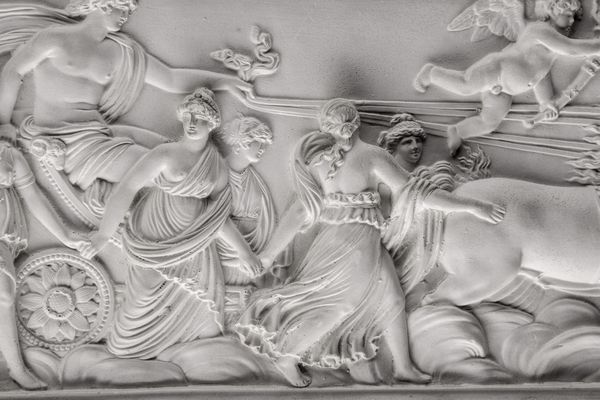
'Weird sisters'
- The witches are also called the 'weird sisters' . This has roots in classical mythology: the three 'wyrd' sisters were the fates, who knew men's destinies.

Meeting Macbeth
- The audience see them planning to meet Macbeth. This suggests that nothing that happens is accidental.

Significance of the number three
- The witches often speak or work in threes.
- Throughout history, the number three has frequently been seen as a magical number.
- In Greek and Roman mythology, witches who talked about fates (the wyrd sisters) were in a group of three. In Norse mythology, there were also a group of three women who made predictions about the future.
- The Rule of Three is a pagan belief – it states that whatever energy witches put into the world will be returned to them three times.
- In Macbeth , the witches seem to be in a group of three, and speak in threes, to strengthen their power.

Cannot be controlled
- When the witches speak with Macbeth and Banquo, they only give them a little information.
- Macbeth orders them to stay, but they disappear: 'Stay, you imperfect speakers. Tell me more.' (1,3)
- This shows that he cannot control the witches' actions (or his own fate).

- The spirits that the witches conjure (make appear by magic) are 'their masters' . This shows that supernatural beings or creatures control them.
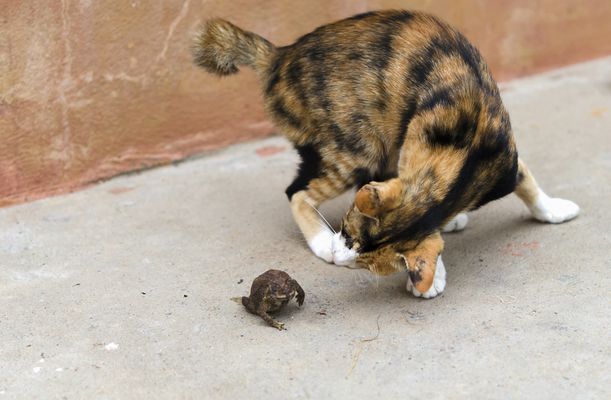
Graymalkin and Paddock
- The witches talk about 'Graymalkin' and 'Paddock' (1,1).
- These are a cat and a toad. People believed that witches had animal helpers to help them do their wicked deeds.
- Shakespeare relates to these characters to show the audience that they are wicked creatures.
The Witches - Evil
The witches symbolise the evil of witchcraft in the following ways:
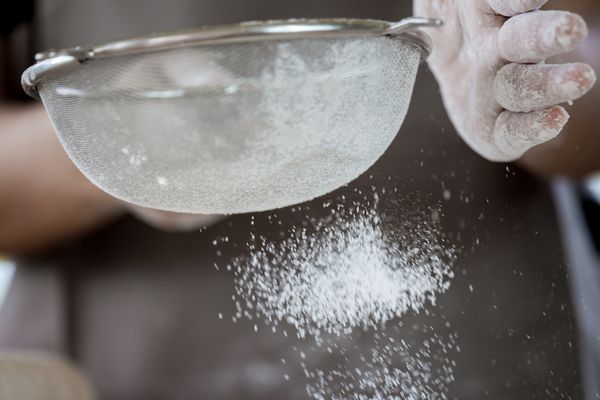
Relevance of the sieve
- The idea that one of the witches can sail in a sieve ( 'in a sieve I’ll thither sail' (1,3)) is related to the accusations made against the Berwick witches.
- These were a group of people accused of trying to harm King James I when he returned with his new wife across the North Sea.
- Shakespeare makes it very clear that these women embody (express) all the evil-doing associated with witches at the time.

Inhumane looking
- When Macbeth and Banquo first see the witches, Banquo doesn’t know what they are: 'What are these, / So withered and so wild in their attire, / That look not like th' inhabitants o' th earth, / And yet are on' t?' (1,3).
- The witches don't look human. Their clothing is 'withered' and 'wild' . This suggests that they don't live like normal members of society.

Ugly appearance
- Banquo struggles to identify whether they are women or not: 'you should be women / And yet your beards forbid me to interpret / That you are so' (1,3).
- Their unconventional (not normal), even ugly appearance is perhaps to remind the audience of how unattractive witchcraft was. Women who practised it started to look inhumane.
- This shows Shakespeare conforming to the ideas of Jacobean England, where the supernatural was feared and seen as unnatural. Those who practised it were viewed as evil – the witches’ ugly appearance may echo this apparent inner-evil.
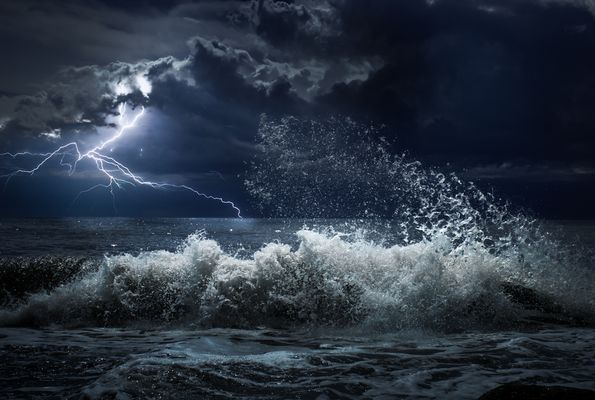

Disrupt the natural order
- The witches chant the line 'Fair is foul and foul is fair' (1,1). This shows that the natural order of things is already being disrupted and this will continue throughout the play.
- The natural order is disrupted because of the witches.
- Nature becomes harsher (lots of bad weather, like thunder and lightning), the God-appointed king is murdered, friendships are severed, children are killed before their parents (Macduff’s son is slaughtered in front of his mother), and Lady Macbeth takes her own life before her time.

- At the start of Act 1, Scene 3, the witches are talking about what they have been doing.
- The Second Witch says things like 'killing swine' - this suggests that the witch has been harming animals.
- The first witch says a story about how she plans to torture a sailor whose wife refused to share her chestnuts: 'Bit in a sieve I'll thither sail, / And like a rat without a tail, / I'll do, I'll do and I'll do' (1,3).
- Immediately, the witches are shown to be ruthless and evil – they harm things just because they can, or because they cannot get their own way.
The Witches - Casting a Spell
In Act 4, Scene 1, the witches meet to cast a spell. This scene is full of exotic and revolting ingredients, including parts of people's bodies and bits of unusual animals. The charm that they chant is one of the most famous parts of the play: 'Double, double toil and trouble, / Fire burn and cauldron bubble.'
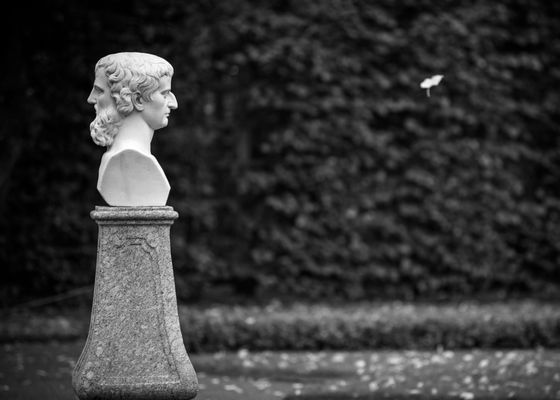
Double meanings
- These lines show that the witches’ speeches (and their intentions) are full of double meanings – they are not what they appear, and they cannot be trusted.
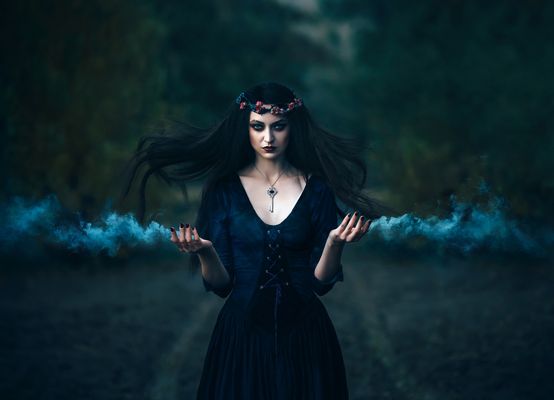
Trochaic tetrameter
- Shakespeare usually writes in iambic pentameter, so this highlights the witches as unusual.
- This structure shows that the witches speak in a different way to everyone else and that they are doing something incredibly important, as they stress these harsh sounds and repeat the lines themselves.
- This moment is almost a threat to Macbeth – they are chanting and aiming their spell at him, and it is a powerful spell.
1 Literary & Cultural Context
1.1 Context
1.1.1 Tragedy
1.1.2 The Supernatural & Gender
1.1.3 Politics & Monarchy
1.1.4 End of Topic Test - Context
2 Plot Summary
2.1.1 Scenes 1 & 2
2.1.2 Scene 3
2.1.3 Scenes 4-5
2.1.4 Scenes 6-7
2.1.5 End of Topic Test - Act 1
2.2 Acts 2-4
2.2.1 Act 2
2.2.2 Act 3
2.2.3 Act 4
2.3.1 Scenes 1-3
2.3.2 Scenes 4-9
2.3.3 End of Topic Test - Acts 2-5
3 Characters
3.1 Macbeth
3.1.1 Hero vs Villain
3.1.2 Ambition & Fate
3.1.3 Relationship
3.1.4 Unstable
3.1.5 End of Topic Test - Macbeth
3.2 Lady Macbeth
3.2.1 Masculine & Ruthless
3.2.2 Manipulative & Disturbed
3.3 Other Characters
3.3.1 Banquo
3.3.2 The Witches
3.3.3 Exam-Style Questions - The Witches
3.3.4 King Duncan
3.3.5 Macduff
3.3.6 End of Topic Test - Lady Macbeth & Banquo
3.3.7 End of Topic Test - Witches, Duncan & Macduff
3.4 Grade 9 - Key Characters
3.4.1 Grade 9 - Lady Macbeth Questions
4.1.1 Power & Ambition
4.1.2 Power & Ambition HyperLearning
4.1.3 Violence
4.1.4 The Supernatural
4.1.5 Masculinity
4.1.6 Armour, Kingship & The Natural Order
4.1.7 Appearances & Deception
4.1.8 Madness & Blood
4.1.9 Women, Children & Sleep
4.1.10 End of Topic Test - Themes
4.1.11 End of Topic Test - Themes 2
4.2 Grade 9 - Themes
4.2.1 Grade 9 - Themes
4.2.2 Extract Analysis
5 Writer's Techniques
5.1 Structure, Meter & Other Literary Techniques
5.1.1 Structure, Meter & Dramatic Irony
5.1.2 Pathetic Fallacy & Symbolism
5.1.3 End of Topic Test - Writer's Techniques
Jump to other topics

Unlock your full potential with GoStudent tutoring
Affordable 1:1 tutoring from the comfort of your home
Tutors are matched to your specific learning needs
30+ school subjects covered
Exam-Style Questions - The Witches









IMAGES
COMMENTS
The essay suggests that while the witches played a significant role in manipulating Macbeth's thoughts and desires, Macbeth's choices and actions were driven by his own free will. Despite the influence of the supernatural, Macbeth had opportunities to change course but lacked the willpower to do so, ultimately sealing his tragic fate.
The witches, often referred to as the three "weird sisters," are Macbeth's dark and mysterious guides on his descent into evil and tyranny. The play opens with their premonition that "fair ...
The Five Prophesies of the 'Macbeth' Witches. During the play, the "Macbeth" witches make five key prophesies: Macbeth will become Thane of Cawdor—and eventually King of Scotland. Banquo's children will become kings. Macbeth should "beware Macduff.". Macbeth cannot be harmed by anyone "of woman born.".
Secondly, the witches play an important role in bringing Macbeth's ambition to the fore. Their prophecies, for example, open Macbeth's eyes to the possibility that he can be more than just a thane ...
The history of the witches in Macbeth. Magic and devilry were on people's minds in 1606, the year Macbeth was first performed. England's new Scottish king James was known to his subjects as a committed opponent of witchcraft and a scholar of black magic. And less than two years after James's succession, and perhaps six months before ...
In Macbeth, act 1, scenes 4-5, what do the witches say to Macbeth? Macbeth 's meeting with the Witches actually occurs in Act I , Scene 3. The Witches call Macbeth by his current title, Thane ...
The focus of the essay is on the witches' influence on Macbeth and his actions. The sentence structure is generally clear and varied, though there are some awkward constructions that detract from the overall flow of the essay. Grammar is generally good, with a few minor errors. The essay is written in the third person, which is appropriate for ...
In conclusion, the witches' prophecies in Macbeth play a vital role in shaping the narrative and exploring important themes. These prophecies act as a catalyst for the characters' ambition, raise questions about fate versus free will, and highlight the corrupting nature of unchecked ambition. The prophecies not only drive the plot forward but ...
The natural order is disrupted because of the witches. Nature becomes harsher (lots of bad weather, like thunder and lightning), the God-appointed king is murdered, friendships are severed, children are killed before their parents (Macduff's son is slaughtered in front of his mother), and Lady Macbeth takes her own life before her time.
The first scene brought the witches before us; the second gave us a noble picture of Macbeth. Now the two parties, the tempters and the tempted, meet, and from their meeting and the witches' prophecy proceed directly all the remaining events of the story. The witches awaken in Macbeth the passion of ambition, which henceforth is the mainspring ...
Act 4, scene 1. Scene 1. Synopsis: Macbeth approaches the witches to learn how to make his kingship secure. In response they summon for him three apparitions: an armed head, a bloody child, and finally a child crowned, with a tree in his hand. These apparitions instruct Macbeth to beware Macduff but reassure him that no man born of woman can ...
The witches in Macbeth symbolize chaos, evil, and the supernatural. They represent the dark forces that influence Macbeth's actions and foreshadow his downfall. Thematically, they highlight the ...
One possible motivation for the witches' actions in Macbeth is their desire to exert their power and influence over mortal beings. Throughout the play, the witches display a sense of superiority and control, manipulating the lives of the mortal characters for their own amusement. Their ability to foresee the future and manipulate events gives ...
In the caricature play, the witches are displayed to illustrate a suspicious and daunting setting, surrounding the contemporary audience which leaves them on the edge. In act 1 scene 1, the three witches are shown to be "upon the heath" where "thunder and lightning" is occurring. The use of pathetic fallacy used in the opening really ...
What impact do the witches' prophecies have on Macbeth in Act 1, Scene 3? At this stage, Macbeth is transfixed by the possibility of his success. He is intrigued by the three promises made by the ...
The witches on their blasted heath are weird in the original sense: unearthly, uncanny, what Banquo calls "fantastical." Their warts and rags may make them scary. Their warts and rags may make ...
Macbeth Essay: Witches Essay. A. Leah Brayshaw. 12. Hello, I've written an essay on how the witches are provoked in the play 'Macbeth'. Enjoy, any feedback would be great and a predicable grade if able to. In the eponymous play 'Macbeth', the three witches are presented to almost illustrate the setting surrounding the contemporary ...